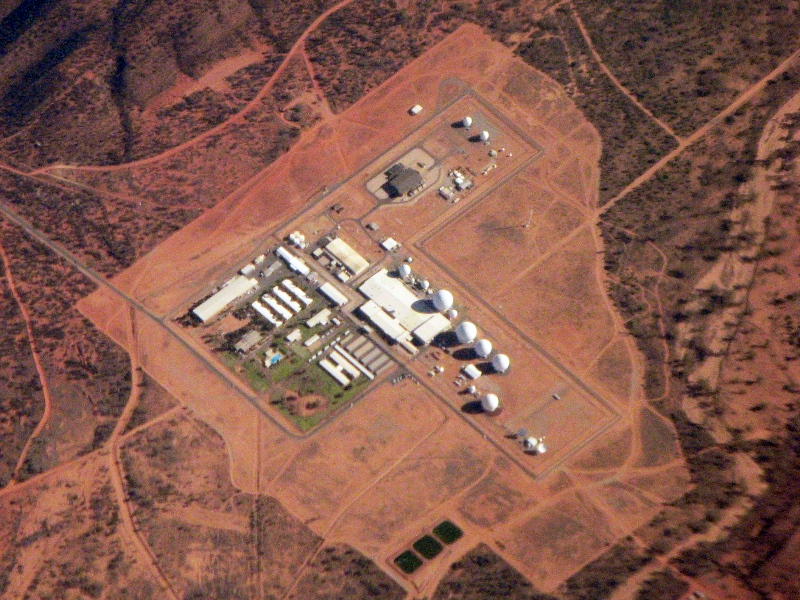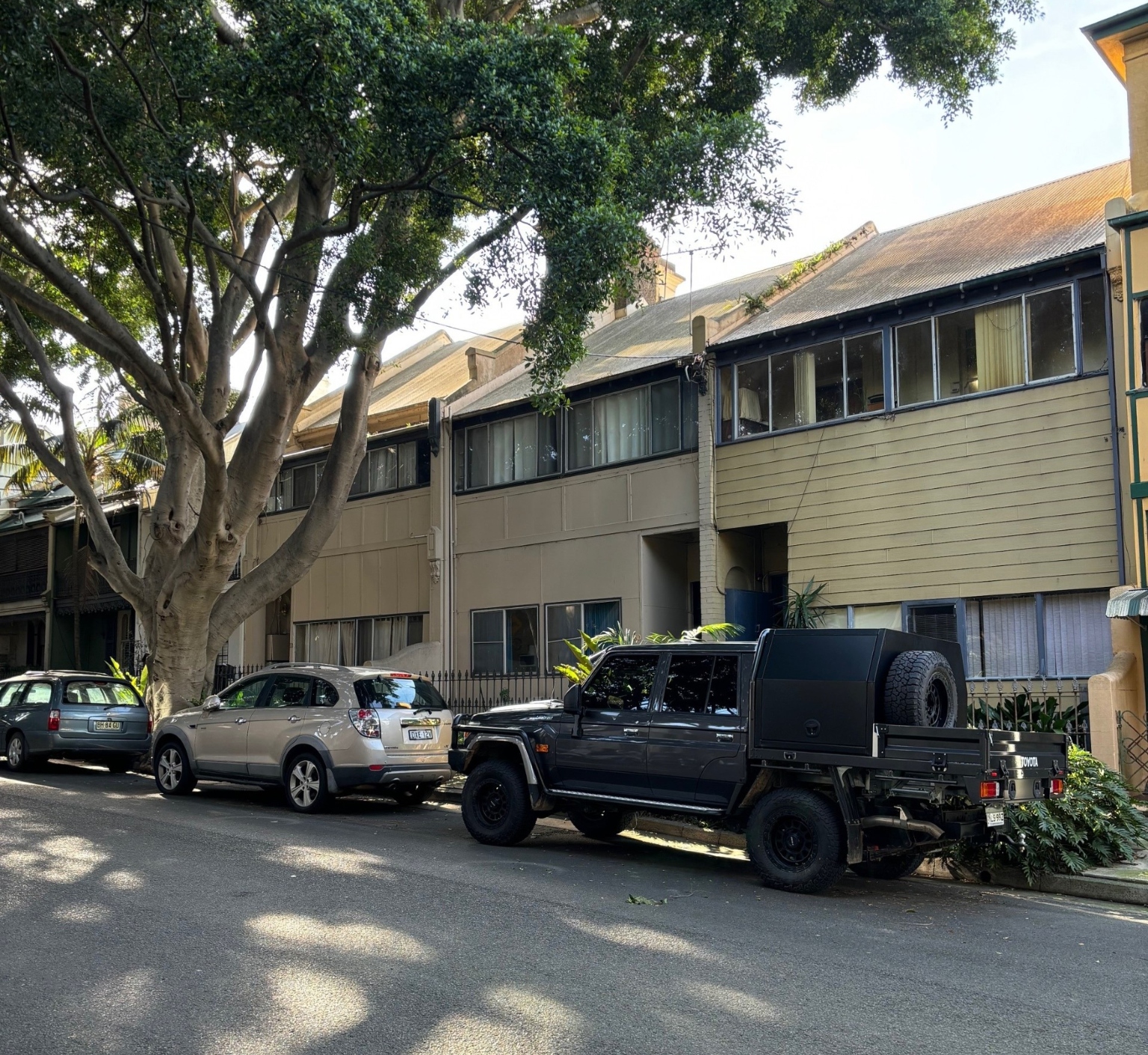

by HOPE PRATT
Hidden in a desert valley just 18 kilometres outside of Alice Springs sits the eyes and ears of the world: Pine Gap. Known to locals as the Base, Pine Gap is a satellite intelligence and signals intelligence (SIGINT) surveillance base, jointly operated by the USA and Australia.
The exact details on Pine Gap’s operations are few and far between, but what is known for certain is the role it has played in providing the US with global surveillance and intelligence gathering capabilities. From the Soviet Union’s nuclear missile programs to the War On Terror, Pine Gap has been there, watching.
On Saturday 15th June, Peter Cronau reported that these eyes and ears have been expanding. According to Saturday’s Paper, starting in March of 2020 Americans cleared 14 hectares of land to makeway for 10 new satellite dishes to be installed.
Part of this construction involved building three large radomes; golf ball-like containers that protect the equipment inside from weather and observation. This brings the total number of the Base’s radomes, dishes and antennas to 45. Additionally, the main complex building also underwent construction.
According to Cronau’s report, all of this was done without the consultation of Parliament or local council development agencies. The only reason Declassified Australia, the first to report on the development, was able to track the construction was because of public satellite images.
This lack of transparency set off alarm bells for Australians for War Powers Reform (AWPR), an organisation that advocates for legislative reform to the way Australia goes to war.
“The lack of transparency surrounding this work is unacceptable,” said Dr Alison Broinowski, a former diplomat and spokesperson for AWPR.
“Australians expect sensitive decisions such as these to be made in an open and accountable way, including a discussion parliament but this report shows the parliament has been side-lined again.”
Of course, the goings-on at Pine Gap have always been opaque. When it was first being built in the late ’60s, it was billed to locals as a space station. Only later was it revealed to be a CIA operation to survey the Soviet Union.
There have been peaks and troughs of concern over the years regarding Pine Gap’s transparency, but it is still a largely unconsidered aspect of Australia’s military relationship with the US precisely because of its secrecy.
This could be explained away by a need for national security, but when the work Pine Gap undertakes directly involves Australia in global conflicts it is not officially taking part in, things get complicated. More so, it puts Australia in the firing line.
City Hub spoke with Dr Broinowski about this lack of transparency. She noted that the primary goal of the AWPR is to advocate for democratic decisions to be made about going to war, and Pine Gap’s lack of transparency hinders this process.
“[The AWPR] believe that the only proper way in a democracy or a government to propose a war, have it debated in the parliament and then be followed by a vote for or against,” said Dr Broinowski.
“No matter how much of the facts they actually reveal, the secretiveness of Pine Gap has been known to cause problems from its very earliest days up until now, and [there has been a] failure of successive Australian governments to tell people what is going on.”
Dr Broinowski went on to cite the work of Professor Richard Tanter, who demonstrates the instability Pine Gap puts Australia in. Should broader US political tensions heighten with our neighbours in the Indo-Pacific region, Australia is in the line of fire. Most notably with China.
Cronau’s report explained that the most recent radome developments are likely aimed at strengthening the US’ ability to track and survey China’s nuclear missile silos. While this could be argued as a defensive measure, Dr Broinowski remarked it is not unlikely for China to see it as an offensive act.
“If there were to be a war involving China, one of the first things China would do would be to attack those facilities.”
She continued, “They would take them out because not only are they a very important security source of communications, but also because they would prefer to do that rather than to attack the mainland United States.”
This is not a new conversation. Since Pine Gap’s Cold War operations, concern over a nuclear attack on Australia has been at the forefront of protest conversations since its opening in 1970. This is a primary concern of AWPR, as are the implication of Australia’s involvement in other global conflicts.
Beyond its potential to survey nuclear developments, Pine Gap has played a role in battlefield surveillance. In 2017, the ABC reported that SIGINT collected by Pine Gap provided it with the ability to spy on military commands and collect communications data, including from personal devices. It also had the potential to be used in geolocation tracking for target elimination.
With its new antennas, Pine Gap is able to collect enormous amounts of data on missile and rocket launches. The location, size, type, warhead, range, speed, trajectory, tracking and target location are all able to be tracked by Pine Gap. This information collection is linked remotely to Buckley Space Force Base in Colorado and provides a critical advantage to the US for battlefield and missile defence strategies.
According to Declassified Australia, Pine Gap has provided similar information to the US in relation to potential strikes on Israel. This coincides with reports from as early as 2013, that the National Security Agency (NSA) has had an intelligence sharing arrangement with Israel.
While it is impossible to tell for certain whether Pine Gap is providing intelligence to Israel regarding its bombardment of the Gaza Strip, it is still worth questioning given Pine Gap’s history in surveilling the Middle East since the Gulf War in 1990.
ABC Journalist Alexandra Barwick stated in an interview with The Briefing, that a former NSA worker, David Rosenburg, has stated that Pine Gap is watching the Middle East and the current war in Gaza would be of interest to the US.
This once again puts Australia in a precarious position. As the International Criminal Court (ICC) investigates Israel’s attacks on Gaza for a potential Genocide, Dr Broinowski states that Pine Gap operations could make Australia complicit in any ICC findings.
“What international law requires is for us to take every means that we can at once to support the findings of the International Court of Justice, which have said that there is a potential genocide to being committed in Gaza,” Dr Broinowski explained.
“If in fact, we are still providing either weapons or parts of weapons or technology and so on to Israel, and trading in defence equipment with Israel, that would seem to undermine human rights.”
In Dr Broinowski’s opinion, Pine Gap only serves American interests. “I call it an American base because it is an American base,” she put it bluntly.
“The Australian Government will not admit what’s going on. If they did, I think that they would find themselves in hot water with their American ally.”
All of this is despite a promise of greater transparency from defence minister Richard Marles back in 2023, following an inquiry into how Australia goes to war.
“Richard Marles said that there will be much greater transparency and accountability in the future. Now we aren’t seeing it, and the current example of Pine Gap makes it even more of an empty promise,” stated Dr Broinowski.
“Pine Gap, although we don’t have the details to spell this out, appears to me, and appears to our organisation to be illegal in national terms.”
Dr Broinowski goes on to say that it seems the greatest threat Pine Gap’s secrecy poses to Australians — from unannounced expansions to the role it plays in global politics — is its ability to skirt accountability on all fronts, and thrust Australia into danger without us even knowing.
“The reason we’re not being told about this is that this sort of thing involves Australia in war without actually saying so, to act in other countries with which we are not at war.”









